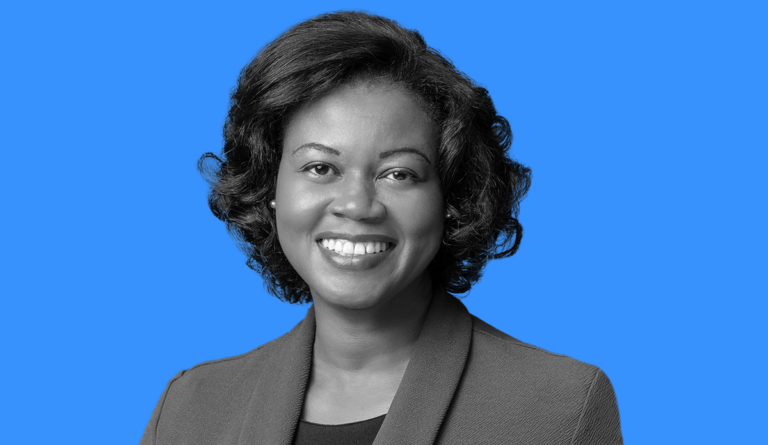Cheryl Clark
Cheryl Clark, executive director and senior vice president of the Institute of Health Equity Research, Evaluation, and Policy at the Massachusetts League of Community Health Centers, shares about her work and how public health research can support equity-based program design.

Read Time: 5 minutes
Published:
Cheryl Clark is the inaugural executive director and senior vice president of the Institute of Health Equity Research, Evaluation, and Policy (IHE) at the Massachusetts League of Community Health Centers, which supports the scientific infrastructure and program implementation needed to identify and sustain the most effective strategies for attaining equity in health and health care.
Often, biomedical research examines issues without engaging with and understanding the community-based factors that influence health. Ethical and culturally aware research looks at individual health in the context of systemic barriers. This research can be used as evidence for the necessity of public health institutions like community health centers (CHCs) that combat health inequity at individual and societal levels.
CHCs deliver clinical services and address systemic issues that affect health. The nation’s first CHC was founded in 1965 in Boston, Massachusetts. There are now 52 CHC organizations with 285 sites across the Commonwealth that provide high quality health care to nearly one million state residents.
Cheryl Clark is the inaugural executive director and senior vice president of the Institute for Health Equity Research, Evaluation, & Policy (IHE) at the Massachusetts League of Community Health Centers. Clark is a physician and social epidemiologist who values research approaches such as community-based participatory research to engage with communities and unveil the social and structural influences on health.
Clark recently spoke with Public Health Post about her work studying the structural barriers to health and how public health research can support equity-based program design.
PHP: Community health centers (CHCs) are a vital part of your work. What does this work look like?
Clark: Our key goal at the IHE is to support community-driven research, evaluation, and policy with CHCs. These centers provide the infrastructure for taking care of diverse populations and providing services that address and move the social determinants of health. CHCs are employers within their communities and have programs that make sure that the assets of their patient populations are respected and built upon. The Institute is building resources and serving as a networking body so that practitioner-scholars and academics can meet on equal footing.
How would you define health injustice as it relates to your work in social epidemiology?
My work in social epidemiology focuses on measurement and understanding the connections between social environments and health or health care utilization. When we think about the term “injustice,” we’re really reflecting on our choices as social beings. We get together and we make choices as a society. That decision process, though, is fraught with power dynamics and belief systems that embody structural inequity. The choices that we make become embedded in law and in custom: African Americans disproportionately die in childbirth; women depend on the judgments of others on what they can do with their bodies.
I’m interested in how we build those structures, how they lead to unjust outcomes for diverse populations, and how to put more equitable structures into scientific projects.
Finding this field and learning that I wanted to study health justice came from my mentors, folks like Camara Jones, Nancy Krieger, Lisa Berkman, and Ichiro Kawachi. Sandro Galea has also been a shining light in this field. His example was an important one for me as I was entering public health.
What does it mean to do community-based participatory research?
When we talk about the social determinants of health, we’re also talking about community. It’s not all about injustice. It’s also about assets. And the greatest assets that we have in a society are our community connections and the ways that we love, care, advocate, and provide social support for each other. Community-based participatory research brings all these principles together. It’s an approach to research that respects the identity of populations and invests in them. It focuses on those assets. It’s also an important example of how to ethically move science forward by valuing the lived experience of communities.
What can science and research do to better engage with communities and public health?
We need more emancipatory research, which means we need to shape research to help us change the underlying structures that perpetuate social inequity. We need research questions that relate to the lived experience of diverse populations, and we also need to fund the expertise of CHCs to address the inequity. Science can do a lot more to invest and create the structures for community participation and ownership of research. For example, since the COVID-19 pandemic, there’s been a heightened awareness of the need to engage and prioritize the needs of diverse populations so those communities could participate in vaccine testing and exploration. What we are seeing, though, is that after some of those funds go away, the underlying inequities really haven’t changed.
You’re speaking at Boston University School of Public Health’s annual Shine Lecture. To you, what is the intersection of health, law, ethics, and human rights, and why is it important for public health?
The structural and social determinants of health really make that connection. The World Health Organization Framework in Closing the Gap in a Generation helps us to understand that health is embedded in legal, economic, cultural, and political structures – structural determinants. These structures impact our behaviors and the ways that we treat each other in health care settings. The understanding of health as a human right is fundamental to being able to conduct research and see outcomes that improve the well-being, dignity, and respect that all people deserve.
Dr. Clark will share more about her work at Boston University School of Public Health’s annual Shine Lecture on Tuesday, April 9. Register here.
This interview has been edited for length and clarity. Photo provided.



